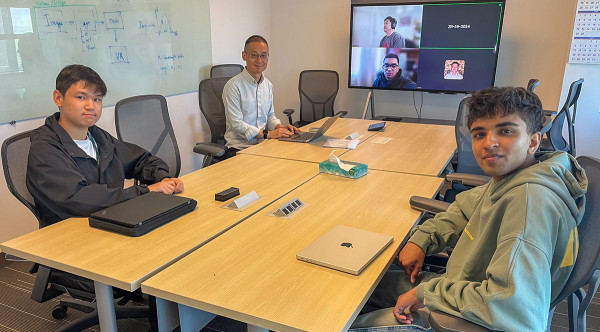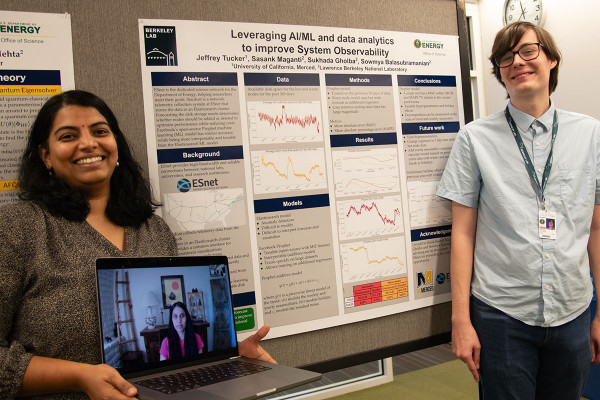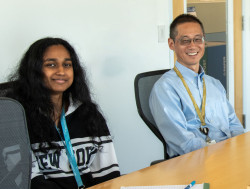From AI to Quantum: ESnet’s 2025 Summer Interns Explore Networking’s Frontiers
By Bonnie Powell, media@es.net

Bay Area high school students Zhile Zhang (left) and Shubh Jani (right) worked with ESnet Advanced Technologies and Testbeds Group Lead John Wu (center) and Alex Sim (on zoom, top left) on an in-network caching project through Berkeley Lab's Experiences in Research program.
What happens when super-smart students team up with innovative ESnet engineers and researchers? This summer, the answer includes machine learning models that can forecast network demand, quantum computing resource simulations, IPv6 testing, and in-network caching systems that will help influence how scientists use data.
From the first nervous presentation in June to the final poster session in August, our interns learned to explore their options, dive deeper, and explain their work to anyone who would listen. Now, you can meet them — and see how a summer at ESnet can change the way someone thinks about not only networking, but learning.
Practice, practice, practice
Our 15 high school, undergrad, master’s, and Ph.D. student interns worked with mentors from the Measurement & Analysis, Advanced Technologies & Testbeds, Pilots & Prototypes, Orchestration & Core Data, and quantum networking teams. The ESnet cohort joined nearly 100 other Computing Sciences Area interns at casual social gatherings, multiple cross-Area research spotlight seminars and career preparation seminars; and tours of National Energy Research Scientific Computing Center (NERSC), the Advanced Light Source, and the Cyclotron. The CS Area Summer Program culminated Aug. 5 with a research poster session in which 63 students speed-explained their work to curious Area scientists and ESnet engineers.
The ESnet students had been preparing for the poster session all summer. They met weekly to present their progress with each other as a group, both virtually and in person, in a Research Updates seminar organized by mentor Advanced Technologies & Testbeds Group Lead John Wu, who was mentoring several of the students. They attended ESnet all-staff meetings as well as a special “ESnet History and Career Paths” session.
“I want to make the students feel welcome and valued here. For that they need to understand how their small piece of the research fits into the project — to understand the context and the background, and to be able to talk about that as well as their own piece confidently,” says Wu. “If they can truly talk about their work, the big picture, then I can send them to competitions, which will help raise awareness of us as an institution. And it will serve them well in job interviews. I would have really appreciated having had that training in grad school.”
That’s why Wu insists on the weekly practice sessions — and why he includes students at all levels of research. “Every time they present an update, they restate the problem their project is trying to solve, so it becomes second nature," he explains. "They will learn the most about presenting and speaking from those who are just ahead. That’s why I invite all the interns to practice together. High school students can look up to undergrads, the undergrads to the master’s, and the master’s to the Ph.D. students.”
Learning is a two-way street
Mentors are also learning from their interns. “Mentoring is really not a one-way thing," says Chris Tracy, Planning & Architecture Group Lead, who supported Nick Buraglio and Jiachuan Tian in mentoring Ryan Rearden and Shining Yang. “The students bring a new energy, a new perspective. I always learn something from them myself, for example from their questions and insights when you’re explaining things to them.”

ESnet engineer and former intern Sowmya Balasubramanian mentored Jeffrey Tucker with help from Measurement & Analysis colleagues Sukhada Gholba (on screen) and Sasank Maganti
Several ESnet interns have gone on to join ESnet as staff. Summer 2024 intern Johanna Lee continued to work part time with the Measurement & Analysis group and, after graduating from UC Berkeley in May, has now joined the team as a contractor.
"I was an intern with ESnet myself once. They took a chance on me, so I want to give back," said Sowmya Balasubramanian, Measurement & Analysis software engineer, who mentored Jeffrey Tucker with help from M&A colleagues Sukhada Gholba and Sasank Maganti.“I try to mentor the way I was mentored: provide an overall direction and guidance, but give them ownership and the freedom to explore on their own.”
Read what some of our interns had to say about their experience in the snapshots below.




